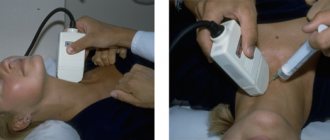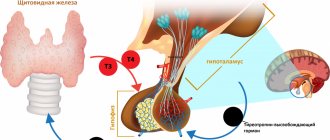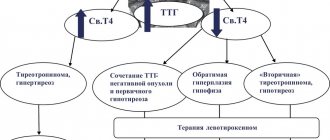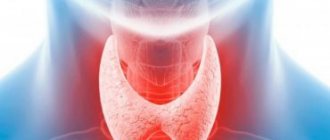Thyroid diseases
First of all, it is worth understanding what kind of organ the thyroid gland is and what it affects. A person's thyroid gland is located in the front of the neck, so that the doctor can feel it during a routine examination. It is one of the organs of the endocrine system (organs that produce hormones) and is responsible for the synthesis of the hormones T3, T4 and calcitonin, which regulate the functioning of the entire body along with the immune and nervous systems.
Thyroid diseases are most common in women, as they are more susceptible to hormonal fluctuations associated with monthly menstruation, pregnancy and menopause.
The organ itself is very small, its weight in an ordinary person does not exceed 20-30 grams. The overall size of the thyroid gland is of great importance, since in some diseases it can increase or decrease and it is important to pay attention to this, however, throughout life, depending on the age of the patient, its size may change slightly.
With iodine deficiency in the body, the thyroid gland cannot synthesize the hormones necessary for the body. And iodine must be supplied to the body with food daily.
At the moment, there is no clear classification of thyroid diseases, but they can be divided into several groups:
- arising due to insufficient production of thyroid hormones (for example, hypothyroidism);
- with an excess of hormone production (hyperthyroidism);
- congenital pathologies (poorly formed organ, its absence, etc.);
- inflammatory processes (thyroiditis);
- enlargement of individual parts of the organ (any type of goiter);
- malignant and benign formations.
Hypothyroidism
This pathology occurs when there is insufficient production of the hormones T3 and T4.
Hypothyroidism is more common in women than in men. The pathology occurs in 1 man out of 1000, while 19 cases per 1000 women occur.
The disease can be asymptomatic for many years, affecting the entire body and disrupting the functioning of many organs, for example, the production of sex hormones decreases, which can lead to the impossibility of conception.
The reason for the development of this thyroid disease can be:
- congenital structural features;
- removal of an organ for any reason;
- strong radioactive exposure;
- long-term iodine deficiency;
- neoplasms in the organ;
- severe neck or head injuries;
- disturbances in brain function;
- chronic diseases of the autoimmune system, etc.
The symptoms of the disease are quite vague and can be confused with other pathologies; you should pay attention if you have:
- constant lack of energy to do ordinary things;
- frequent cramps and pain in various muscles;
- interruptions in heart function, low blood pressure;
- memory impairment;
- pale, dry and flaky skin;
- hair loss and fragility;
- decreased libido and irregular cycles in women;
- excessive swelling for no reason.
Consequences of hypothyroidism
A long-term stay in a lack of hormones can seriously affect a person’s overall health, so in adults problems with the myocardium may begin, endocrine infertility may occur, the menstrual cycle in women may disappear, myxedema, and the worst thing is hypothyroid coma.
Children may experience mental and physical retardation, cretinism, heart disease and low immunity.
Thyrotoxicosis (hyperthyroidism)
This disease is the opposite of the previous one (hypothyroidism), its essence is that the thyroid gland begins to produce an excess amount of its hormones T4 and T3. At the same time, metabolic processes in the body are accelerated, which leads to the development of pathologies in other organs. The heart muscle and nervous system are most affected by hyperthyroidism.
Women of childbearing age (20-45 years) are most susceptible to this pathology.
The reason for the development of thyrotoxicosis can be:
- the most common cause is nodular toxic goiter;
- taking synthetic hormones;
- hereditary predisposition;
- neoplasms of the pituitary gland and thyroid gland.
Symptoms of this thyroid disease in women:
- sweating;
- feeling of a lump in the throat due to an increase in the size of the thyroid gland;
- cardiopalmus;
- constant feeling of thirst;
- sudden weight loss;
- irritability and mild excitability;
- insomnia may be present;
- Itching and heat intolerance may occur;
- from the intestinal tract, diarrhea, lack of appetite and abdominal pain may be observed;
- menstrual irregularities, etc.
Consequences of hyperthyroidism
If drug treatment is not started in time, then in case of advanced disease:
- Surgery may be necessary to remove part or all of the thyroid gland;
- a tumor forms;
- complications on the vocal cords and larynx;
- disturbances in the functioning of the heart.
Autoimmune thyroiditis (AIT)
The disease means chronic inflammation of the thyroid gland, since it was first described by the Japanese surgeon Hashimoto, it has a second name - Hashimoto's thyroiditis. With this disease, the thyroid cells are gradually destroyed and its function is impaired.
AIT can be asymptomatic, but in the future it causes complications in many body systems: it disrupts the functioning of the heart and metabolic processes.
The success of treatment depends on high-quality diagnostics, which is aimed at identifying the form and cause of the disease. There are four main types of AIT:
- chronic – occurs due to excessive growth of T-lymphocytes (most common);
- postpartum – develops due to instability of a woman’s hormonal levels during pregnancy; with timely detection, normal functioning of the gland can be quickly restored;
- painless - is the most dangerous, as it can appear spontaneously and develop unpredictably, the main way to diagnose it is an annual examination by an endocrinologist, an ultrasound scan and blood donation for hormones;
- pharmacological - appears as a result of taking drugs that affect the liver and blood; it is the most complex form, as it is difficult to treat.
Unfortunately, it is impossible to completely get rid of AIT, but treatment removes the symptoms of the pathology and prevents the condition from worsening.
Factors that provoke the development of autoimmune thyroiditis, in addition to those described above, may be:
- mutations in genes;
- abnormal intake of iodine;
- stress;
- chronic infections.
Signs of thyroid disease include:
- a constant state of apathy;
- weight fluctuations for no apparent reason;
- skin aging and hair loss;
- there may be changes in the voice, hoarseness or sore throat;
- increase in throat volume;
- trembling legs or arms;
- mood variability towards aggression and irritability.
Consequences of Hashimoto's thyroiditis
If autoimmune thyroiditis is not treated, a state of chronic hypothyroidism may occur: a constant lack of thyroid hormones, which will lead to the need to take hormonal therapy for the rest of life. The formation of toxic goiter or the development of malignant thyroid lymphoma is possible.
Goiter
The most common pathology is endemic goiter. This is a condition in which the thyroid gland becomes enlarged due to iodine deficiency. The gland begins to grow, and its functionality changes.
More rare causes of goiter development are:
- genetic predisposition;
- disorders of hormonal synthesis;
- deficiency of elements that are involved in maintaining the functioning of the thyroid gland (copper, zinc, manganese, etc.;
- taking medications that interfere with iodine transport;
- chronic infections, worms.
In the structure of endemic goiter, several forms can be distinguished:
- diffuse (persistent disruption of hormone secretion);
- nodular (usually does not interfere with the functioning of the thyroid gland);
- mixed.
Symptoms of this thyroid disease are:
- enlargement of the gland (with nodular goiter, protrusion from the neck area is observed);
- brittle hair and nails, hair loss;
- irritability.
Depending on the type of goiter, symptoms may or may not be present. In general, the symptoms are no different from other thyroid diseases.
Consequences of endemic goiter
The disease brings serious inconvenience with significant enlargement of the organ, for example:
- squeezing in the throat, causing disruption of the blood vessels, nerves and esophagus;
- hemorrhage into the thyroid gland;
- strumit;
- disruption of the heart;
- tumors.
Myxedema
Myxedema is an extreme stage of hypothyroidism that develops against the background of a critical lack of thyroid hormones. The disease is expressed in the fact that as a result of a sharp slowdown in metabolic processes, fluid begins to be retained in the body, which causes swelling of both tissues and organs.
This condition can lead to:
- long-term hypothyroidism;
- tumor processes;
- treatment with radioactive iodine;
- complications of operations on the gland.
Myxedema must be treated only after a thorough diagnosis and treatment is prescribed only by a qualified endocrinologist, since improper treatment can lead to a worsening of the condition and even complete loss of functionality of the thyroid gland.
Cancer
This thyroid disease develops due to abnormal cell growth in the gland itself. There are several types of it:
- papillary (occurs in 75% of patients with this pathology);
- follicular (about 15%);
- medullary (about 5%);
- other types (sarcoma, lymphoma, metastatic cancer, etc.).
The symptoms of a tumor are the same as for other thyroid diseases; only a set of diagnostic procedures will determine its type. More often it develops from a nodular goiter.
Consequences
With timely diagnosis, and this happens in most cases, since in the earliest stages the patient begins to notice anomalies in his condition or external signs (enlargement or bulging of the thyroid gland), the pathology can be quite successfully treated with medications; in some cases, surgical intervention is required, which entails complete organ removal. In this case, the patient will be prescribed hormone replacement therapy for life.
Cretinism
Cretinism is a form of congenital hypothyroidism, and therefore occurs as a disease of the thyroid gland in children.
Hormone deficiency during early development and adulthood causes delayed physical, psycho-emotional and mental development, which leads to cretinism.
Main reasons:
- hereditary factor;
- disturbances in the intrauterine development of the thyroid gland (possibly its complete absence);
- deficiency of iodine and elements related to it (for example, selenium);
- diseases suffered by the mother during pregnancy.
Cretinism is expressed in such aspects as:
- developmental delay;
- long-term healing of the fontanel of the skull in infants;
- disproportionate body (usually a larger head compared to short legs and a small body);
- thick skin;
- rough facial features, etc.
Consequences
If detected early, hormonal therapy is prescribed, and the disease can be completely suppressed.
If the disease is not treated, its consequences include speech delay, slow development of intelligence, poor physical development, unstable psyche, and apathy.
In the practice of one of our endocrinologists, there was a case when a child who looked about 9 years old was brought in for an appointment. He had milk teeth, he was short and could count to 10. But there was one caveat - according to his passport he was 22 years old! And these were all manifestations of late diagnosed congenital hypothyroidism.
FAQ
Close relatives have been diagnosed with thyroid disease, is there a risk of getting sick?
Thyroid diseases are not “contagious”, but there is a genetic predisposition to thyroid pathology. Often (but not at all 100%), several people in one family have thyroid disease. The thyroid pathology does not necessarily have to be the same for everyone; these can be completely different variants of thyroid diseases.
The only serious thyroid disease - medullary cancer - must be checked with all close blood relatives of the patient with this pathology, because There are genetic variants of the disease that affect relatives with 100% probability.
There is nothing to worry about, but a laboratory examination revealed very high levels of antibodies to the thyroid gland in the blood, what next?
In approximately 15-20% of healthy people, antibodies (AT) to various structures of the thyroid gland are detected in the blood (as a rule, these are antibodies to TPO and TG, less often to the TSH receptor). If the thyroid function is not impaired, then the fact of the presence of antibodies will not have clinical significance; let’s call it an “individual feature.” Of course, the mere fact of the presence of antibodies will not be treated, no matter what their level is recorded in the blood. If the function of the thyroid gland is impaired or the size of the thyroid gland increases, determining the presence of antibodies (mostly antibodies to TPO) will indicate the cause of disorders in the gland. The combination of impaired thyroid function and a high titer of antibodies to the thyroid gland makes it possible to establish a diagnosis of autoimmune damage to the thyroid gland. The presence of antibodies to the thyroid gland will dictate the need for more frequent assessment of thyroid function when taking medications with a large (non-physiological) amount of iodine and lithium preparations, as well as during pregnancy, since there may be peculiarities in the functioning of the thyroid gland against this background. Note that the mere presence of antibodies in the blood does not affect your well-being. In most cases, the patient is more frightened by the “number” of antibodies on the laboratory form, which sometimes exceeds the upper limit of normal by hundreds of times. There is no need to treat the “antibody level in the blood”.
What can be done to reduce the risk of disease?
We are not able to influence the genetic predisposition to the disease. It is given to us from birth. The trigger point in the implementation of a pathological hereditary predisposition can be stress, severe infectious diseases, taking certain medications, etc. Therefore, following general recommendations for a healthy lifestyle will to some extent prevent the manifestation of the disease.
To rule out dysfunction of the thyroid gland, what test should be taken?
The first (and sometimes the only) test that needs to be performed if a thyroid dysfunction is suspected is thyroid-stimulating hormone (TSH). If this indicator is normal, then no disturbance in the patient’s well-being can be associated with the thyroid gland. To be fair, it must be said that there are very rare diseases of the endocrine system in which TSH remains normal, but there is a disturbance in the production of hormones. Determining indications for expanding the examination is the prerogative of the endocrinologist examining the patient. Sometimes patients themselves ask the doctor to issue a referral for a study of “all thyroid hormones,” explaining this desire by “dislike” for taking blood for analysis, but this is not always justified. A detailed conversation, an explanation of when an in-depth examination of thyroid function may be required, will help the patient not to spend the “extra”, but also not to miss the “necessary”.
A blood test for thyroid hormones is performed in the first half of the day, on an empty stomach. In women - regardless of the day of the menstrual cycle.
Changes in TSH levels are detected for the first time, do you need to treat immediately?
Most often, a very moderate (up to 10 Med/l) increase in TSH levels is detected with normal T4 levels. This situation first requires re-monitoring after 2-3 months. If this increase is persistent, i.e. If there is no independent normalization of hormone levels, then individually with the patient, with a thorough assessment of concomitant pathology, the endocrinologist decides on the need to prescribe treatment. It is possible that the situation will simply be “taken for granted.” The only category of our patients for whom an increase in TSH levels does not require additional rechecking is pregnant women. In this case, thyroxine therapy is prescribed immediately, because “no time” to recheck in a few months.
I have been diagnosed with autoimmune thyroiditis, what should I do?
When such a diagnosis is established and replacement therapy with thyroxine preparations is prescribed, the dose of the drug is selected under the control of TSH levels. At the onset of the disease, the decrease in the function of the own thyroid gland may not be total, i.e. To compensate for the lack of thyroxine, a small dose of the hormone is required. As the disease progresses, all new thyroid cells are captured by the pathological process and to replenish what is lost, a corresponding increase in the dose of thyroxine is required, reaching over time the individual daily requirement. Patients often draw “their own” conclusions from this fact: “Taking the drug has stopped the functioning of my thyroid gland, now I will be “dependent on hormones.” This popular belief is absolutely not true. It was not the drug intake, but the thyroid gland itself that gradually decreased and finally stopped working. This is a completely natural course of autoimmune thyroiditis, when the need for thyroxine increases as the disease progresses.
How often should thyroid function be monitored?
There are more common and less common thyroid diseases.
In case of autoimmune thyroiditis and a selected dose of thyroxine, it is enough to monitor the TSH level once a year. The exception is pregnancy, when control is carried out once a month. The need for therapy adjustments is discussed with the doctor after receiving the results.
In Graves' disease, thyroid hormones are monitored much more frequently. First monthly, and if there is a good response to treatment, then once every 2 months. A doctor's examination is required, because correction of therapy is possible.
In case of nodular goiter with a confirmed benign structure of the thyroid nodule, thyroid hormones are monitored once a year.
Other, more rare diseases require an endocrinologist to draw up an individual plan for dynamic examination and observation.
What parameters, besides thyroid hormones, need to be monitored?
For some thyroid diseases, periodic monitoring requires thyroid ultrasound. To a greater extent, this applies to nodular non-toxic goiter, when the size of nodular formations in the thyroid gland is assessed over time. Also, dynamic ultrasound of the thyroid gland is performed with diffuse enlargement of the thyroid gland, when it is necessary to assess the dynamics of the size of the thyroid gland with or without treatment. Ultrasound of the bed of the removed thyroid gland and lymph nodes is necessary after radical treatment of thyroid cancer.
As a rule, there is no need to dynamically perform thyroid ultrasound when monitoring a patient with autoimmune thyroiditis.
Other special methods of dynamic examination (scintigraphy, computed tomography, MRI of the neck) are rarely prescribed, only if there are special indications for this.
The material was prepared using data from the “Clinical Guidelines of the Russian Association of Endocrinologists for the diagnosis and treatment of autoimmune thyroiditis in adults”; “Clinical recommendations of the Russian Association of Endocrinologists for the diagnosis and treatment of nodular goiter”
Signs of thyroid disease
The insidiousness of thyroid diseases is that the symptoms are vague and may not bother a person for a long time, and an accurate diagnosis can only be made with a comprehensive diagnosis.
Let's name the main signs that should prompt a woman or man to undergo examination:
- causeless weight fluctuations;
- hair loss, dryness and fragility;
- brittle nails;
- irritability;
- decreased attention and poor memory;
- lack of strength and apathy;
- discomfort in the throat area;
- cardiac dysfunction;
- tremor of the limbs;
- voice change.
In our clinic you can donate blood for thyroid hormones.
What solution
Treatment for subacute thyroiditis usually takes 12 to 18 months. In 90-95% of cases, the result is very good - the disease ends in complete recovery, but it also happens that at a late stage hypothyroidism becomes chronic and remains a constant problem.
Permanent hypothyroidism develops in 5-10% of people with lower thyroiditis, according to the American Thyroid Association. Persistent goiter and thyroid dysfunction are most likely after postpartum thyroiditis.
If you suspect thyroiditis, immediately make an appointment with an endocrinologist. Early diagnosis and timely treatment play an important role in preventing the disease from becoming chronic.
Prevention of thyroid diseases
Prevention of any thyroid disease is to eliminate iodine deficiency in the body. The proper functioning of this organ directly depends on the amount of daily iodine intake.
According to the World Health Organization (WHO), a person needs to consume at least 200 mcg per day. For pregnant women, this norm is 250 mcg. In order to provide the body with such an amount of the substance, it is necessary to saturate your diet with foods enriched with it:
- seaweed;
- feijoa;
- haddock, squid, pollock and other fresh seafood;
- a little is found in homemade chicken eggs and milk.
It is worth remembering that the territory of Belarus has an extremely low level of iodine in the soil, so even with food it is quite difficult to compensate for deficiencies. In addition, it is difficult to track the amount of substances entering the body, so many resort to using special iodized supplements.
Prevention of thyroid diseases also includes:
- annual ultrasound to detect thyroid disease in men, women and children;
- taking hormone tests;
- weight normalization (excess weight has a detrimental effect on thyroid health);
- smoking cessation and alcohol abuse;
- maintaining an active lifestyle;
- no deficiency of vitamins and minerals in the body.
Goiter prevention
There is no region in Russia where the population does not experience iodine deficiency, so the consumption of iodized products, primarily salt, is very important for the health of the thyroid gland. In endemic areas, it is useful to take iodine preparations; for an adult, 120 mcg of iodine is needed daily, for pregnant and lactating women - 250 mcg.
Surgeries on the neck organs require extensive surgical experience and technical virtuosity; the surgeons and oncologists of our clinic have created all the conditions for high-quality care for our patients.
Book a consultation 24 hours a day
+7+7+78
Diagnostics
Depending on the suspected pathology, the doctor prescribes an individual set of diagnostic procedures. In this paragraph, we will describe all types of diagnostics of thyroid diseases, and the endocrinologist will prescribe the necessary ones for a particular patient.
The following are used for both preventive and diagnostic purposes:
- examination and palpation of the thyroid gland;
- ultrasound examination of the organ (ultrasound);
- donating blood for thyroid hormones (T3, T4, TSH);
- taking a puncture (biopsy);
- computed tomography or MRI.
The Amadeus Clinic has created a diagnostic base for identifying thyroid disease in children, women and men. In our center you can take any test: from hormone concentrations to genetic mutations. We have modern high-precision equipment for ultrasound examination of the thyroid gland, which is carried out by experienced ultrasound diagnostic doctors and endocrinologists.
What is a goiter?
In medicine, goiter refers to all benign neoplasms in the thyroid gland, both detectable by touch and already visible. A goiter is a knot in the thickness of unchanged tissue or an increase in the entire volume of the gland. With nodules it will be nodular or multinodular , and simply an increase - diffuse and a mixture of them in the form of a diffuse-nodular goiter .
On average, a diffuse version of goiter is found in every third person, but in different regions of Russia, benign lesions of the gland of various types - nodes or enlargement are found in 5% - 70% of residents, and the vast majority are women. It is not known why women are more susceptible to the disease; a direct connection between the level of production of thyroid hormones and the activity of the reproductive organs has been identified, and the leading cause of goiter is also explainable.
Treatment
The thyroid gland is rightfully considered the queen of the endocrine system, because it controls the functioning of most organs through the production of hormones. Due to the fact that it affects the entire body, its treatment must be done extremely carefully and only under the supervision of a doctor.
If the thyroid disease is a consequence of another disease, then first or in parallel it is treated in the same way.
Depending on the cause of the thyroid disease, the diagnosis and individual medical history, the patient is prescribed treatment. The main types of treatment are:
- hormone replacement therapy;
- additional iodine intake is prescribed;
- diet enriched with vitamins and minerals;
- surgical intervention.
Experienced doctors work at Amadeus Clinic. The patient can make an appointment with one of our specialists. The medical center employs several specialists with sufficient experience. After the necessary diagnosis, the doctor you choose will be able to make a diagnosis and prescribe treatment, which will be monitored and changed if necessary. We have various payment methods for our clients.
Causes of goiter
Due to the disease, goiter can be sporadic and endemic, and in this classification they focus not on the individual development of the pathology, but on the state of goiter morbidity in the region as a whole. The pathology is endemic in areas where goiter of any size and shape is found in every twentieth child and every third adult.
The most common causative factor in the development of pathology is iodine deficiency, which leads to a decrease in the production of iodolipols by thyroid cells, for which the production of glandular tissue growth stimulants increases compensatoryly. The enlarged glandular tissue is actually a goiter, which over time undergoes involution with the formation of nodules.
The formation of goiter is helped by a defect in the synthesis of thyroid hormones or perverted sensitivity of cells to them, taking certain medications that promote goiter growth and are called “goitrogens”. Goitrogens or thyreostatics are used to treat thyrotoxicosis. Pathology can be caused by some components of food; all of them have the ability to block the production of thyroid hormones; it is believed that soy flavonoids and thiocyanates contained in a variety of cabbages, corn and tobacco leaves have a particularly active effect on glandular tissue.
Hereditary predisposition is also important for the development of the pathological process, but specific genes have not yet been identified.
Book a consultation 24 hours a day
+7+7+78
Symptoms of thyroiditis
Clinic of acute thyroiditis:
- swelling of the neck in front;
- high fever;
- pain radiating to the ear, lower jaw, when swallowing and turning the head;
- redness of the skin on the neck;
- pain when palpating the projection of the thyroid gland.
When an abscess attaches: fever, chills, intoxication.
Possible symptoms of subacute thyroiditis:
- low-grade fever;
- the goiter is dense, sometimes painful on palpation;
- neck pain may occur. The pain starts on one side of the neck and gradually spreads to the other half. The pain can be localized in the middle of the neck, radiating to any direction;
- pain (if any) often radiates to the ear, lower jaw, intensifying when turning the head and swallowing;
- enlarged lymph nodes (cervical, parotid, submandibular);
- tachycardia;
- weight loss;
- sweating;
- anxiety;
- heartbeat;
- irritability.
Clinic of chronic autoimmune thyroiditis (Hashimoto's goiter):
- there may be compression in the neck area;
- possible development of hoarseness;
- drowsiness, lethargy;
- fatigue, asthenia;
- enlargement of the thyroid gland;
- the goiter is dense, mobile, painful to the touch;
- Pain may appear in the front of the neck.
Clinic of chronic fibrous thyroiditis (Riedel's struma):
- compression in the neck;
- dense, motionless goiter;
- pain in the neck;
- difficulty breathing;
- swallowing disorders.








